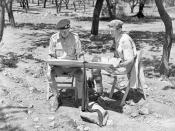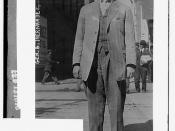Why did some men desert or refuse to obey orders on the Western Front and were they treated to harshly?
The western front was a place of in despicable suffering and death. The trenches were damp and wet. They were brimming with disease. Amongst this there was constant shell fire described as 'true hell on Earth.' The trenches were physical protection from the raging war, but they offered no physiological shelter. Numerous men were pushed past their limits. This lead to soldiers trying to escape. They often deserted and refused to obey orders. Strict leaders like General Haig looked this upon harshly. Because of this, men and boys were sentenced to death. This essay looks at why the soldiers chose to desert and refused to obey orders on the Western Front when they knew the consequences. It explains the different views on the soldiers found guilty of their charges from separate ends of the rankings spectrum.
Shell shock, now known as post-traumatic stress disorder (PTSD), was a common and honest reason for desertation. There were two views on PTSD at that time, neither of them quite right. The first one was that shellshock was just cowardice. A large number of soldiers with the symptoms were put down as malingerers and sent back to the front line. The second theory behind shell shock was that it was caused by heavy artillery. They thought that basting shells create a vacuum and that when air rushes into the vacuum it disturbs the cerebro-spinal fluid, which in turn upsets the workings of the brain. Some doctors said that the only cure for shell shock was complete rest from fighting. Senior officers were likely to be sent home to recuperate, but there was a lot less sympathetic view for ordinary soldiers. Because of this,


